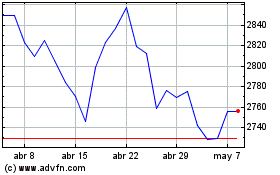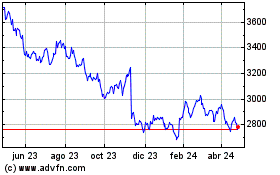Liquor maker is lobbying Indian officials to slash taxes,
preempt prohibition
By Saabira Chaudhuri
This article is being republished as part of our daily
reproduction of WSJ.com articles that also appeared in the U.S.
print edition of The Wall Street Journal (November 11, 2019).
Johnnie Walker-maker Diageo PLC is betting on India, the world's
largest whiskey market, to power its growth. But first, it has to
win over dozens of local governments that want to either ban liquor
or tax it heavily, even as more Indians embrace drinking.
To protect sales, Diageo is helping a number of Indian states
develop tax policy. To demonstrate that it is a responsible actor,
it is rolling out road-safety programs. Diageo is even presenting
ways that states can move up India's ease-of-doing-business
rankings -- which are important for attracting investment -- by
cutting red tape for alcohol.
Indian society has long viewed alcohol consumption as a sign of
moral laxity. Yet, consumption is soaring. The average Indian drank
38% more alcohol in 2017 than in 2010, according to a study in The
Lancet, a medical journal. The rise is among the world's steepest
and has led to more deaths and diseases attributed to alcohol, up
12% and 9% respectively. Booze has also been blamed for road
accidents and wasted household incomes.
The growing popularity of liquor, along with protests from women
who say alcohol leads to domestic violence, is prompting some
Indian policy makers to act. The state of Andhra Pradesh, which is
home to 50 million people, took over thousands of liquor stores
last month as a first step toward prohibition. In August, the top
court in the hill state of Uttarakhand ordered the government to
ban alcohol.
"Some educated people say that drinking liquor is a fundamental
right. I strongly object," Nitish Kumar, chief minister of Bihar, a
state with 100 million people, said in a recent speech. "There is
data to back the claim that liquor is evil for society." After
Bihar banned alcohol three years ago, Diageo's sales slumped in the
state and it was forced to shut its distilleries there.
Navigating India's volatile regulations is an increasing area of
focus for the world's biggest whiskey maker, especially because it
is counting on the country's burgeoning middle class to offset
slowing drinking in the West. Between 2013 and 2014, Diageo paid
$3.2 billion for a controlling stake in United Spirits Ltd.,
India's largest spirits company. It now generates roughly 60% of
its volume growth from the country.
Other alcohol giants, facing similar headwinds, are also betting
on India. Pernod Ricard SA, which bought Seagram Co.'s India assets
in 2001, has pushed pricey brands like Chivas scotch. Sales are
growing strongly and India is vying with China to be Pernod's
second-largest market behind the U.S. Budweiser brewer
Anheuser-Busch InBev SA and other brewers are also doubling
down.
Still, some executives question whether Diageo can successfully
apply its global mantra -- that alcohol in moderation can be part
of a balanced lifestyle -- to India.
"The alcohol culture in India is totally different to the West,"
said Manish Shyam, who worked in corporate affairs for Diageo until
earlier this year. "It's about bang for your buck, about spending
as little as possible and getting the maximum kick."
Moreover, India is one of the world's toughest places to sell
alcohol. Booze is subject to a complex patchwork of state-by-state
regulations, alcohol advertising is banned and imports are taxed at
150%. Diageo India requires about 200,000 permits and approvals
each year to do business.
Influencing regulation in India is like "trying to break a
rock," said Diageo India head Anand Kripalu at an investor event in
May. "You've got to chip away, chip away and one day it'll
part."
In 2015, Diageo set up a 12-person team to improve the alcohol
industry's reputation and influence policy. It's also working with
the International Spirits and Wines Association of India, an
industry trade body, to forestall damaging regulation.
"The prohibitory message was getting picked up a lot," said Indu
Anand, who worked as Diageo India's head of public policy until
2017. "We had to intervene and come up with programs and projects
to say we encourage responsible drinking."
Taxes are a key focus. Alcohol is one of the few industries that
states have been able to tax directly since 2017, prompting states
to raise taxes on booze to generate revenue and discourage
consumption.
In response, ISWAI, the trade body, is holding workshops to
"co-create" mutually beneficial tax policy for imported brands with
excise officials. Its argument: Lower taxes boost demand and
generate higher tax revenue.
That effort secured a 30% price cut for Johnnie Walker Black
Label last year in Karnataka, the state that's home to Bangalore.
Volumes jumped 64% in the five months after the move, a success
story that's now being used to convince regulators elsewhere.
Volumes of Pernod's Chivas brand jumped 332% after taxes fell
28%.
"My message to everyone is it's not a Pernod versus Diageo
fight. It is everybody versus the government," said Amrit Kiran
Singh, who runs ISWAI.
The World Health Organization says high taxes are among the most
effective tools to curb binge drinking, and many public health
researchers are wary of the industry's efforts to influence tax
policy and public-health interventions. "You become the policeman
as well as the thief," said Vivek Benegal, professor of psychiatry
at the Bangalore-based National Institute of Mental Health and
Neurosciences.
In 2017, India's Supreme Court banned the sale of booze at
shops, bars, restaurants and hotels within 500 meters (547 yards)
of national and state highways in a bid to reduce road accidents.
The move contributed to Diageo's sales falling by more than half
during that fiscal year.
To prevent further restrictions, Diageo is funding programs
endorsed by the transport ministry that it says are designed to
improve road safety and encourage responsible drinking. The
ministry is relying on Diageo to educate university students
applying for driver's licenses about the dangers of speeding, not
wearing helmets and driving drunk.
Harman Singh Sidhu, a road-crash victim turned campaigner whose
2012 petition led to the highway liquor ban, said industry efforts
to curb drunken driving pale in comparison with advertising that
encourages drinking. While alcohol ads are banned on TV and in
print, brands advertise heavily on social media. They also sell
booze-branded products such as bottled water, soda and playing
cards that generate little revenue but serve as effective marketing
tools.
"As far as India is concerned, we are in the lap of the
industry," Mr. Sidhu said.
Write to Saabira Chaudhuri at saabira.chaudhuri@wsj.com
(END) Dow Jones Newswires
November 11, 2019 02:47 ET (07:47 GMT)
Copyright (c) 2019 Dow Jones & Company, Inc.
Diageo (LSE:DGE)
Gráfica de Acción Histórica
De Mar 2024 a Abr 2024

Diageo (LSE:DGE)
Gráfica de Acción Histórica
De Abr 2023 a Abr 2024
